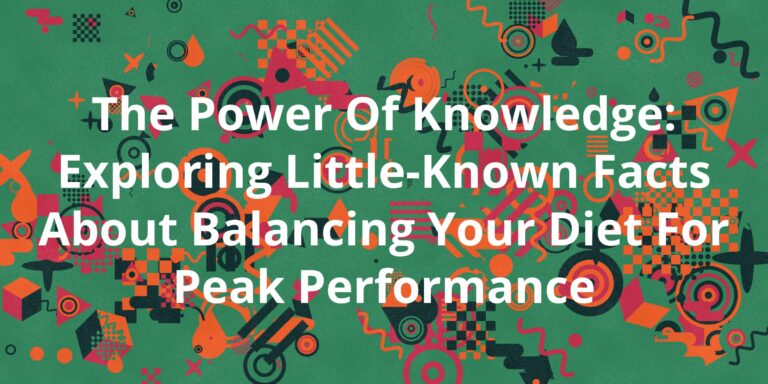Introduction:
Nutrition is the foundation of our physical health and well-being. It plays a crucial role in determining our energy levels, mood, and overall health. In this article, we will explore the basics of nutrition and provide you with a comprehensive beginner’s guide to help you unleash your potential.
1. Understanding Macronutrients:
Macronutrients are essential nutrients that our body needs in large quantities to function properly. They include carbohydrates, proteins, and fats. Carbohydrates provide energy, proteins help build and repair tissues, and fats aid in the absorption of fat-soluble vitamins and minerals.
2. Balancing Your Macronutrient Intake:
The key to optimal nutrition is finding the right balance between your macronutrient intake. A balanced diet should consist of approximately 45% carbohydrates, 10-35% protein, and 20-35% fat. However, this can vary depending on individual needs and goals.
3. Eating a Variety of Foods:
Eating a variety of foods is essential for optimal nutrition. Each food group provides unique nutrients that our body needs to function properly. It’s important to include all five food groups in your diet, including fruits, vegetables, whole grains, lean protein sources, and healthy fats.
4. Eating Fruits and Vegetables:
Fruits and vegetables are rich in vitamins, minerals, and antioxidants that help protect our body from disease and promote overall health. Aim for at least 5 servings of fruits and vegetables per day.
5. Choosing Whole Grains:
Whole grains provide complex carbohydrates, fiber, and B vitamins that are essential for energy production and digestion. Choose whole-grain bread, pasta, rice, quinoa, and other grains instead of refined grains.
6. Selecting Lean Protein Sources:
Protein is essential for building and repairing tissues, and it helps keep us feeling full and satisfied. Good sources of lean protein include chicken, fish, tofu, beans, lentils, and nuts. Aim for 0.8 grams of protein per pound of body weight per day.
7. Incorporating Healthy Fats:
Healthy fats are essential for overall health and can help improve heart health, brain function, and skin health. Good sources of healthy fats include avocados, nuts, seeds, fatty fish, and olive oil.
8. Staying Hydrated:
Water is essential for our body to function properly. Aim for at least 8-10 cups of water per day to help flush out toxins, improve digestion, and regulate body temperature.
9. Avoiding Processed Foods:
Processed foods are often high in sugar, salt, and unhealthy fats, and they can contribute to weight gain, chronic disease, and other health problems. Try to limit your intake of processed foods and focus on eating whole, nutrient-dense foods.
10. Practicing Mindful Eating:
Mindful eating involves paying attention to the food you’re eating, savoring each bite, and avoiding distractions while eating. This can help you make healthier food choices, reduce overeating, and improve your relationship with food.
Conclusion:
Nutrition is a complex topic, but by understanding the basics and making small changes to your diet, you can unleash your potential and improve your overall health and well-being. Remember to eat a balanced diet that includes a variety of nutrient-dense foods, stay hydrated, and practice mindful eating. With these tips, you’ll be on your way to optimal nutrition and a healthier, happier life.



